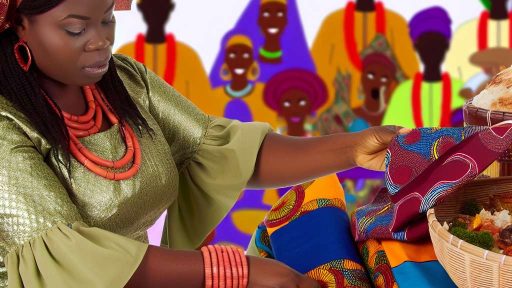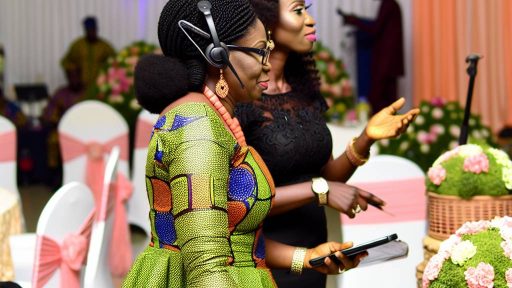Understanding the Importance of a Wedding Budget in Nigerian Culture
Significance of Budgeting
A wedding budget serves as a financial roadmap for couples.
It helps avoid overspending during the planning process.
Moreover, a well-planned budget minimizes stress and anxiety.
Control over finances leads to better decision-making.
Cultural Expectations
Nigerian weddings are often elaborate and vibrant events.
Cultural traditions can create significant financial demands.
Families strive to uphold these customs while managing costs.
Setting a budget allows couples to meet expectations realistically.
Prioritizing Key Expenses
A budget helps identify and prioritize essential services.
Couples can allocate funds for venues, attire, and catering.
Understanding priorities ensures that important elements are not overlooked.
This leads to a more fulfilling wedding experience.
Encouraging Family Contributions
Family involvement is common in Nigerian weddings.
Discussing the budget can encourage family support and contributions.
Open communication about finances strengthens relationships.
It sets clear expectations for everyone involved.
Flexibility and Adjustments
A budget is not set in stone; it may require adjustments.
Throughout the planning, circumstances may change unexpectedly.
Being flexible allows couples to adapt to new financial situations.
This adaptability can lead to creative solutions to stay on track.
Identifying Key Expenses for a Nigerian Wedding Celebration
Venue Costs
The venue is one of the most significant expenses for a wedding.
Selecting a location that reflects the couple’s taste is crucial.
Consider both indoor and outdoor options carefully.
Rental fees may vary based on the venue’s popularity and location.
Catering Expenses
Catering greatly influences the wedding’s overall experience.
Plan a diverse menu to please all guests.
Include traditional Nigerian dishes to honor cultural practices.
It’s wise to discuss food portions with your caterer.
Attire and Accessories
Wedding attire constitutes a substantial part of the budget.
Brides typically invest in elaborate gowns and accessories.
Grooms need suitable suits or traditional wear as well.
Don’t forget about attire for parents and bridal party members.
Decoration and Floral Arrangements
Decoration sets the tone for your celebration.
Flowers, centerpieces, and draping enhance the venue’s appeal.
Collaborate with a decorator to align with your vision.
Allocate funds for both ceremony and reception decor.
Photography and Videography
Documenting the special day is essential for memories.
Invest in a skilled photographer and videographer.
Research potential candidates by reviewing their portfolios.
Discuss packages that meet your financial plans.
Entertainment
Entertainment contributes to a lively atmosphere.
Consider hiring a DJ or live band to keep guests engaged.
Think about cultural performances common in Nigerian weddings.
Review contracts to ensure all details are covered.
Guest Accommodations
If guests travel from afar, accommodations matter greatly.
Negotiate group rates with local hotels.
Provide information on available options to your guests.
Consider transportation for guests between venues.
Miscellaneous Expenses
Plan for additional costs that arise unexpectedly.
These can include permits, tips, and gift bags.
Having a financial cushion helps mitigate last-minute surprises.
Always keep a detailed list of all planned expenses.
Setting a Realistic Overall Budget
Creating a wedding budget starts with understanding your overall financial picture.
First, identify the total amount you can realistically spend.
This includes money saved and any contributions from family.
Next, break down your budget into categories.
Typical categories include venue, catering, attire, and entertainment.
Consider setting allocations for each category.
Prioritize essential elements over less critical luxuries.
Lastly, leave room for unexpected expenses.
Sources of Funding
Determine where your funds will come from to cover costs.
Common sources include personal savings and contributions from family.
You may also consider wedding loans if necessary.
Discuss with family members if they are willing to help financially.
Remember to communicate openly about expectations and capabilities.
Save on Wedding Expenses
Cutting costs can help stretch your budget further.
Consider a wedding during the off-peak season for better rates.
Choose local vendors to avoid extra shipping or travel fees.
Additionally, DIY projects can save money on decor and invitations.
Ask friends and family for assistance with specific tasks.
Using online resources can also offer additional savings tips.
Explore Further: How to Plan a Traditional and Modern Nigerian Wedding Hybrid
Breaking Down Costs
Venue
The venue often takes up a significant portion of your wedding budget.
Start by choosing a location that suits your style.
Consider traditional halls, churches, or unique outdoor spaces.
Research various options to find the right fit.
Additionally, remember to factor in rental fees and deposits.
Some venues may offer packages that include catering or decoration.
Be sure to compare these packages with other vendors.
Attire
Your wedding attire includes the bride’s gown and groom’s suit.
Allocate funds for alterations and accessories as well.
Nigerian weddings often feature stunning traditional garments.
Explore local designers or tailors for unique pieces.
Don’t forget shoes, jewelry, and other personal items.
Consider renting attire to save money, if needed.
Catering
Catering is a vital aspect of any Nigerian celebration.
Decide between buffet or plated service based on your preference.
Include a variety of traditional dishes to satisfy your guests.
Be mindful of dietary restrictions and preferences.
Request quotes from multiple caterers for comparison.
Ask about menu testing before making your final decision.
Decorations
Decorations enhance the overall atmosphere of your wedding.
Begin with a clear vision of your theme and colors.
Consider elements like lighting, flowers, and table settings.
Try to use local vendors for cost-effective options.
DIY decorations can also save you money, if you’re creative.
Prioritize decorations that will make the biggest impact.
Uncover the Details: Essential Steps to Plan a Nigerian Wedding Without Stress
Considering Cultural Traditions and Their Financial Implications
Understanding Nigerian Wedding Traditions
Nigerian weddings are vibrant and culturally rich celebrations.
They often feature traditional ceremonies, music, and dance.
Each ethnic group has unique customs that add to the experience.
Understanding these traditions helps in budgeting effectively.
Traditional Engagement Ceremonies
Engagements are significant in Nigerian culture.
They often involve a formal introduction and negotiation of bride price.
These expenses can vary widely depending on family expectations.
Plan for costs associated with gifts and ceremonies when budgeting.
Wedding Attire Costs
Bridal and groom attire is often elaborate and colorful.
Traditional outfits can significantly impact the budget.
Consider the cost of multiple outfits for various events.
It’s essential to allocate a reasonable budget for quality garments.
Guest List and Venue Selection
The invitation list can be extensive in Nigerian weddings.
There’s a tradition to invite friends, family, and community members.
Choosing a suitable venue can influence overall costs.
Large venues may require greater financial investment.
Catering and Traditional Dishes
Nigerian weddings are known for their delicious food offerings.
Catering can be one of the most significant expenses.
Offer a variety of dishes to cater to diverse tastes.
Consider both local and traditional cuisine to please guests.
Entertainment and Photography
Live music and entertainment enhance the wedding atmosphere.
Budget for hiring good musicians, dancers, or DJs.
Hiring a professional photographer is also crucial.
Ensure they capture the essence of the celebration.
Coordinating with Family Traditions
Consider family requirements and obligations in your planning.
Each family may have specific expectations or traditions.
Consult with family members to ensure inclusion and support.
This collaboration can help manage costs and expectations.
Final Considerations for Budgeting
Create a detailed budget that reflects all aspects of the wedding.
Include a contingency fund for unexpected expenses.
Regularly review the budget as planning progresses.
Communicate openly with all parties involved to avoid misunderstandings.
Uncover the Details: How to Plan a Nigerian Wedding on a Budget Without Sacrificing Style

Creating a Wedding Budget Spreadsheet or Planner Template
Understanding Your Financial Boundaries
Begin by assessing your total available funds for the wedding.
You should take into account savings, contributions, and potential loans.
This initial assessment will guide your budget creation process.
Identifying Your Priorities
Discuss the most important elements of your wedding with your partner.
Decide what aspects are non-negotiable, like venue or catering.
Carefully consider what can be flexible to adapt to budget constraints.
Creating a Detailed Budget Spreadsheet
Open your preferred spreadsheet application like Excel or Google Sheets.
Label columns for different categories such as venue, food, and attire.
Add rows beneath these labels for specific items and their costs.
For better management, include columns for estimated and actual costs.
Incorporating A Contingency Fund
Allocate a portion of your budget for unexpected expenses.
Typically, setting aside 10-15% of your total budget is advisable.
This will help you avoid financial stress as planned costs may change.
Tracking Expenses and Adjustments
Regularly update your spreadsheet with actual spending.
Ensure to compare these with your estimated costs for each category.
Make adjustments by re-evaluating items that may need downsizing.
Using Online Wedding Budgeting Tools
Consider utilizing online tools and apps designed for wedding planning.
These tools often come with templates that simplify tracking finances.
They can also provide helpful reminders for payments and deadlines.
Communicating with Vendors
Engage openly with your vendors about your budget limitations.
Many professionals can suggest packages that suit your budget.
Maintain transparency to foster goodwill and potential discounts.
Finalizing Your Budget
As the date approaches, review your budget to ensure all is on track.
Confirm that deposits and payments align with your budget sheet.
This final review will help eliminate any last-minute surprises.
Find Out More: The Essential Checklist for Planning a Stress-Free Nigerian Wedding
Tips for Sticking to Your Budget and Avoiding Common Pitfalls
Set Clear Financial Goals
Begin by defining your overall budget for the wedding.
Include all anticipated expenses to get a complete picture.
Next, determine priorities for your budget allocation.
Identify which elements matter most to you and your partner.
For instance, focus on venue, catering, or photography.
Research and Compare Costs
Invest time in researching various vendors in your area.
Compare prices and services of multiple options.
Request quotes from different vendors to ensure transparency.
Additionally, read reviews to gauge vendor reliability.
Seek recommendations from friends or family who recently married.
Create a Detailed Budget Spreadsheet
Use a spreadsheet to track all your wedding expenses.
Include estimated prices and the final amounts spent.
Regularly update this document to reflect changes or new costs.
This practice helps you stay organized and informed.
Make sure to allocate a contingency fund for unexpected expenses.
Communicate with Your Partner and Families
Keep the lines of communication open with your partner.
Discuss your budget together and agree on limits for each category.
Engage family members to understand their expectations or contributions.
This inclusiveness helps avoid misunderstandings later on.
Set boundaries on spending based on collective conversations.
Stick to the Plan and Avoid Impulse Buys
Commit to sticking to your original budget plan.
Avoid impulse purchases that can derail your financial goals.
For example, resist unnecessary add-ons from vendors.
Instead, focus on essentials that align with your vision.
Create a waiting period before finalizing any big purchase.
Review and Adjust Regularly
Schedule regular budget review sessions with your partner.
Evaluate your spending against your budgeted amounts.
Identify any areas where you need to adjust your plans.
This flexibility allows you to adapt without going over budget.
Ultimately, being proactive can save you stress as the wedding day approaches.
Planning for Contingencies: Unexpected Costs and Last-Minute Changes
Understanding Possible Unexpected Costs
Weddings often encounter unforeseen expenses.
These costs can arise from vendor changes or additional guests.
Consider including a buffer in your budget for such situations.
Common Unexpected Expenses
Unexpected expenses may include extra decor or upgraded catering.
Some couples face costs from last-minute dress alterations.
Others find travel expenses for guests can unexpectedly rise.
- Additional rentals for seating or equipment
- Unexpected venue fees for overtime
- Increased costs for last-minute floral arrangements
Strategies to Prepare for Last-Minute Changes
Create a contingency plan in advance to manage last-minute changes.
Identify key areas where flexibility is necessary.
Communicate openly with your vendors about potential changes.
Including a list of preferred alternatives can help.
Setting Aside a Contingency Fund
Designate a percentage of your budget for emergencies.
This fund allows you to accommodate unexpected costs easily.
Planning around 10-15% of your overall budget is wise.
Staying Calm Under Pressure
Weddings can be stressful, especially with last-minute issues.
Practice mindfulness techniques to manage stress levels.
Delegate tasks to trusted friends to lessen your load.
Additionally, maintain open communication with all parties involved.




